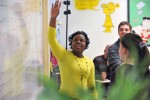
Mae Claxton, assistant professor of English, was eager for her 9-year-old son to start learning Spanish and was disappointed he would not get to do so at his school.
“When you learn another language, you begin to learn about another culture, see a different perspective and think in new ways,” said Claxton. “I just feel very strongly that it is important to help our kids at an early age begin acquiring new language skills and see the world beyond Cullowhee.”
As Claxton and Jamie Davis, assistant professor of Spanish, discussed the need, they developed an idea: Western Carolina University students majoring in Spanish or Spanish education could apply their skills while serving the community by teaching a class at Cullowhee Valley School.
With critical logistical and volunteer support from the school’s Parent Teacher Association, backing from school administrators and a $1,200 WCU Quality Enhancement Program Assessment Mini-Grant, five WCU students are teaching Spanish at the school this spring.
As part of an exploratory class at WCU entitled “Español 393,” college students are teaching Spanish to a group of 20 students from kindergarten through second grade and 20 students from third through fifth grade. They meet for one hour after school on Monday and Wednesday afternoons.
WCU students craft lesson plans based on goals and outcomes established in state guidelines for teaching second languages, and they develop class activities designed to be dynamic, varied and fun. Their elementary school students have played a version of “Jeopardy” in Spanish and learned the days of the week through a song set to the tune of “The Addams Family” theme song. Student groups have competed as Spanish-speaking countries, with WCU student teachers offering such congratulations as “Yay, Bolivianos!” In one activity, students talked about the earthquake in Chile and what they could do to help.
“The creativity with which our students have approached their teaching has been really touching and overwhelming,” said Davis. “They are so enthusiastic that we are getting an influx of interest from other Spanish majors. They are shining.”
Claxton’s son, Brannan (known in class by his Spanish name, “Damian”), said he is learning a lot, more than the numbers, colors and days of the week. Alessia Zanin-Yost, research and instruction librarian at Hunter Library, said her daughter repeats the new words she learns over and over when she comes home.
“In the program, the kids not only learn basic Spanish, but also about the culture, not being afraid to speak another language, to respect others that do not speak English, and forge friendships,” said Zanin-Yost. She said she can see the difference it has made to her daughter and recounted an experience at a park in which her daughter saw classmates with whom she had not spoken before because of the language barrier.
“My daughter pointed to her friend’s jacket and said, ‘Esta es one rojo jacket,'” said Zanin-Yost. “Her friend was happy to hear her talking. This is a great program because everybody has something to gain.”
For Paul Leone, a freshman Spanish education major at WCU from Connecticut, the experience is about being part of an initiative that promotes a multilingual America. Leone struggled to learn Spanish in high school and did not begin to feel comfortable with it until he moved to Charlotte and began working and conversing with people who had relocated from Mexico.
Now, he is teaching students who are younger than he was when he started to learn Spanish. In one class, he thought his students did not comprehend a concept he shared to help remember numbers past 15. “But later, when a student was trying to translate a number into English, one of his classmates suggested the concept I taught earlier,” said Leone. “I really felt like a teacher that day.”
Jodie Wade, president of the school’s PTA, said the class has been wonderful for students, and that they would welcome the opportunity to support such language opportunities again. For the spring class, PTA members organized class registration, arranged the afternoon snack with the help of the cafeteria manager, scheduled parent volunteers for the classes and collected money for class supplies. “We have agreed to end the class with a fiesta,” said Wade. “I am very thankful that my son has been able to participate in this class, and I hope we can build upon this experience with future offerings.”
Claxton shares the vision. She would like to see Cherokee language be offered and recently was contacted about interest in having Chinese students share lessons about their language and culture. “This was just what I had hoped – that by getting the ball rolling and seeing parents’ interest we could introduce more language opportunities into the school system,” said Claxton.






